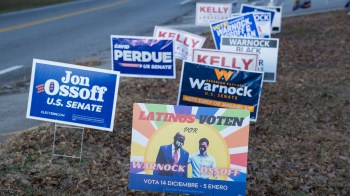Leadership PACs key to political funding
TEXT OF STORY
KAI RYSSDAL: Campaign finance reports filed late last night show that John McCain raised more than $62 million in the second quarter. Of course, he didn’t do it alone. There are lots of politicians out there asking for contributions to the McCain campaign. And lots of politicians making contributions to the McCain campaign as well. But they’re not doing it with their own money. They use what are called “leadership political action committees” — organizations that any lawmaker can set up for the express purpose of raising and spending money.
In the first part of a special series on lawmakers and their political cash flow, Marketplace’s Steve Henn explains how those PACs work in the presidential election.
STEVE HENN: When Barack Obama turned down federal funds for the general election, he boasted to his legion of small donors that his campaign had found a better way.
BARACK OBAMA: Instead of forcing us to rely on millions from Washington lobbyists and special interest PACs, you’ve fueled this campaign with donations of $5, $10, $20 — whatever you can afford.
It’s true Obama’s campaign hasn’t taken money from lobbyists or political action committees run by corporations and unions. But his own Leadership PAC has.
Leadership PACs are a carbon copy of corporate and union PACs. Their primary purpose is to raise money and share it with other party members facing tough election fights.
Obama’s PAC is called the HopeFund and it has accepted hundreds of thousands of dollars from Washington lobbyists and special interests. Obama’s not the only one with a Leadership PAC. John McCain and nearly all the other candidates who competed in the primaries run these PACs, too.
And the reality is that politicians use this money for all sorts of things, not just to contribute to others’ campaigns.
Fred Wertheimer is founder of the campaign finance reform group Democracy 21. He says the lion’s share of the donors to these accounts are actively lobbying on Capitol Hill.
Fred Wertheimer: It’s Washington-influence money almost entirely.
And he says it’s a way for donors to give much larger amounts than they could otherwise.
WERTHEIMER: Because they are really vehicles for outside donors to give contributions to a member that substantially exceed what they can give for their campaigns.
Federal Election Commission filings show that in 2006 — a year before the official start of this presidential campaign — all the major candidates used Leadership PACs to lay the groundwork for their bids.
John McCain used his Leadership PAC to pay for $1.3 million in private plane flights all across the country before the official start of the presidential race. Meredith McGehee at the Campaign Legal Center says many of the trips happened to take him to important primary states.
Meredith McGehee: Like Iowa and New Hampshire — just to take a couple for example. And then you can go and use that Leadership PAC to house some of your staff while they are waiting for the real campaign to start.
Campaign funds have strict limits on donations and what you can do with the money. So McGeHee says leadership PACs have become an indispensable tool.
McGeHee: You can use this money to pay for things that you don’t want to use your hard-earned money for.
FEC reports show that key campaign advisors for McCain, Clinton and Obama all drew salaries from their candidates’ PACs before the presidential race officially began. Other candidates used their PACs to buy voter lists in Iowa and New Hampshire, or even pay for broadcast ads.
Meredith McGehee says one of the few rules governing Leadership PACs bars candidates from using them to pay for their own campaigns, for president or Congress.
McGeHee: The reality is in this presidential race that whole system has fallen apart.
And in recent years, the campaign’s main regulator, the Federal Election Commission, hasn’t weighed in on whether anyone’s crossed the legal line.
In Washington, I’m Steve Henn for Marketplace.
There’s a lot happening in the world. Through it all, Marketplace is here for you.
You rely on Marketplace to break down the world’s events and tell you how it affects you in a fact-based, approachable way. We rely on your financial support to keep making that possible.
Your donation today powers the independent journalism that you rely on. For just $5/month, you can help sustain Marketplace so we can keep reporting on the things that matter to you.


















